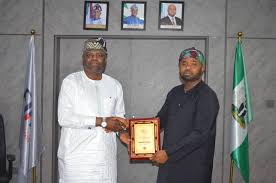The Federal Inland Revenue Service (FIRS) and the Revenue Mobilisation Allocation and Fiscal Commission (RMAFC) have come together to set up a joint technical committee that will help improve how tax revenues are tracked and shared across the federal, state, and local governments in Nigeria.
The committee was officially inaugurated on Tuesday, May 14, 2025, at the FIRS headquarters in Abuja. This was revealed in a statement made public on Thursday by Mr Sikiru Akinola, who is the Technical Assistant on Media to the FIRS Chairman.
Speaking during the event, Mr Bimbo Kolade, who is the Chairman of the Inland Revenue Monitoring Committee (IRMC) under RMAFC, said the FIRS plays a big role in making sure the country has steady revenue. He explained that it is through tax revenue collected by FIRS that the federal, state, and local governments are able to plan and fund development projects.
According to Kolade, in the year 2024, tax revenue collected by FIRS made up about 65 percent of the total money that was shared among Nigeria’s three tiers of government at the Federation Allocation Account Committee (FAAC). He said this means that tax has now overtaken crude oil earnings from the Nigerian National Petroleum Corporation (NNPC) as Nigeria’s biggest source of income.
Kolade praised the FIRS Chairman, Dr Zacch Adedeji, for what he described as excellent performance since taking over the leadership of the agency in September 2023. “If not for the wonderful job our chairman has been doing since September 2023 at the Service, Nigerians may have been crying a little more with what we have passed through,” he said.
He also commended Adedeji for how he handled the controversies that came with the recent Tax Reform Bills. He mentioned that there was a small disagreement between FIRS and RMAFC over issues like Value-Added Tax (VAT) allocation, but it was quickly resolved because of the calm and mature approach taken by Adedeji.
Kolade went further to explain that the Inland Revenue Monitoring Committee (IRMC) is in charge of making sure that all taxes due to the federation account—including VAT and Companies Income Tax (CIT)—are properly collected and recorded.
On his part, Dr Zacch Adedeji said the new committee is not just for show but a serious step towards making tax revenue collection and sharing more transparent. He said FIRS and RMAFC have always worked closely together, and this new joint committee is to make that cooperation even stronger.
Dr Adedeji explained that while FIRS is focused on collecting non-oil taxes, RMAFC is in charge of making sure that the money is properly monitored and shared in line with the law. He said both agencies share a common goal, which is to build a stronger and more transparent revenue system for Nigeria.
He said their partnership has already brought some good results. These include joint efforts like sharing data, checking records together, and monitoring how much revenue is collected. He said this has helped in planning better and making sure there is accountability.
However, Adedeji said there is still room for improvement. He said there is a need to create a structured system that will guide the partnership. This new system, according to him, should include regular strategy meetings between both agencies, working together on research, using technology to link their data systems, clearly stating who does what, setting shared targets, and keeping track of progress.
He believes that if this is done, it will reduce problems like duplication of efforts, poor communication, and confusion about roles. It will also help both agencies to become more effective and creative in how they manage the country’s tax revenue.
This joint move by FIRS and RMAFC is coming at a time when Nigeria is facing serious financial pressure. The country is dealing with lower earnings from oil, increasing debts, and the urgent need to grow its income from taxes and other local sources. The new committee is expected to help Nigeria manage its revenue better and improve how the money is shared to meet the needs of Nigerians at all levels.
